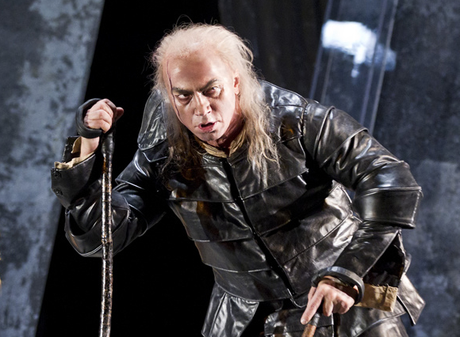by Paul J. Pelkonen

Dmitri Hvorostovsky as Rigoletto, a role he sang at the Met and Covent Garden.
Photo by Johan Persson, © Royal Opera of Covent Garden
To start with, this is not the greatest recording of Rigoletto ever made. In fact this opera is so dependent upon the casting of its three leads and its conductor that few will agree on what their Promethean ideal set is. However, for fans of the late Mr. Hvorostovsky, and for those who are curious as to what an orchestra in Kaunas, Lithuania sounds like (the Kaunas City Symphony Orchestra) on a very good night, this set is a worth a listen. As a capstone to a great Verdi career, it is entirely appropriate.
The opening is brisk and businesslike under the baton of Constantine Orbelian. The men of the Kaunas State Choir open the action with the Banda efficiently separated from the main orchestra in the clean stereo picturee. Tenor Francesco Demuro establishes himself with a pleasant, slightly sharp tenor that has a slightly wide vibrato. He reaches aptly above the stave and navigates the little ornamentations in the Duke's short aria. But then the real star of the show arrives as Mr. Hvorostovsky enters, every word pointed and barbed.
The character's true nature is established in the next scene. He utters a haunted "Quel vecchio maledivami!". The voice, finally heard in splendid isolation, caresses every syllable, probing each beat for nuance. His duet with Andrea Mastroni's Sparafucile is punctuated by his short responses, putting meaning into the repetition of "Comprendo!" and "Demonio!" Mr. Mastroni has an amiable instrument, but lacks that last bit of dastardly swagger that can make Sparafucile memorable.
The key to any performance of this opera comes in the next scene: "Para siamo." Mr. Hvorostovsky gives his all here, using his stage experience and musical intelligence to put meaning and depth into each word. His self-loathing, cowardice, and frustration is only hinted at in the opening lines. As the plucked bass strings turn his thoughts toward his boss, the real anger comes roaring out but always carefully sung.. Mr. Hvorostovsky pours it in here, singing gloriously over the rising orchestra and bringing his fury to a boil with that last high passage and the breathless, third repetition of "Quel vecchio maledivame." He manages one last turn as his daughter enters and his performance turns bright and passionate.
Although she sings well with Mr. Hvorostovsky, Nadine Sierra is not an ideal Gilda. She sounds rather shopworn, her soprano lacking the freshness and bloom that one associates with this part. However she does generate sympathy as she is caught in the fearsome gears of this opera's plot and her character's fate is sealed. She is at her strongest in the later acts, in the big duet with her father in Act II and in the big quartet. And the murder scene does what it should, leaving the listener feeling slightly queasy as Gilda sacrifices herself.
The second act works, with the chorus bitter and cynical even as the named courtiers (Marullo and Borsa) are sort of unmemorable. Maddalena (Oksana Volkova) has a pleasing, seductive instrument and she might make a good Carmen. The quartet cracked with tension which breaks in the following storm scene. The finale, with Mr. Hvorostovsky again injecting meaning and experience into every wept line over Gilda's body is affecting, just as it was if you ever saw him sing this role live.

